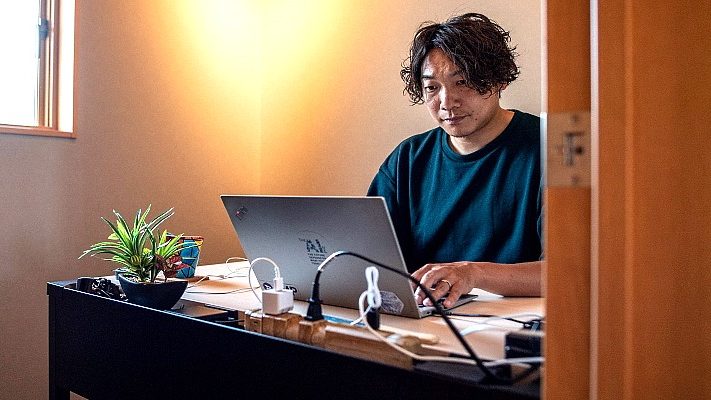
FUJISAWA, Japan: Posted far from home for his job at Japanese conglomerate Hitachi, father of two Tsutomu Kojima was “really lonely” until he began working remotely during the pandemic for the first time. Covid-19 has upended office routines worldwide, but in Japan — where punishing hours and reliance on paper files, ink stamps and fax machines has long been the norm — some say the shake-up was sorely needed. Pre-pandemic, just nine percent of the Japanese workforce had ever teleworked, compared with 32 percent in the United States and 22 percent in Germany, according to Tokyo-based consultancy firm Nomura Research Institute. But a quiet revolution in the country’s rigid business culture is underway, with firms working to digitize operations and offer more flexibility to staff who were once expected to stay late, go drinking with the boss and accept far-flung transfers. Kojima used to live alone in accommodation provided by Hitachi near Tokyo, an hour and a half by bullet train from his family in Nagoya. Back then he would return only twice a month, but now the 44-year-old works exclusively from home, and says he is more productive and closer to his teenage daughters. “I have more time to help them with their studies. My youngest told me she hopes things stay like this,” he told AFP. “I used to feel really lonely” in Tokyo, Kojima said, but he has since realized that “true balance means not giving up on family”. Old habits Nearly a third of jobs in Japan were done remotely during the first Covid wave in spring 2020, the Japan Productivity Centre says, even though the government never imposed strict stay-at-home orders. The rate has since fallen to 20 percent, but that is still far higher than before the pandemic, according to quarterly surveys by the non-profit organization. To encourage telework, the government and some companies made efforts to phase out personalized ink stamps used to certify documents, as well as the ubiquitous fax machine. Often in Japan, “business has to be done in person, on paper”, habits dating back to the 1970s and 80s, when the Japanese economy was booming, said Hiroshi Ono, a professor at Hitotsubashi University specializing in human resources. “One of the things Covid has done is bring those barriers down: work doesn’t have to be done at the office, men can work at home,” he told AFP. Companies are realizing that new ways of working can be more efficient, he added. “Before Covid, it was so important for employees to show that they’re working hard, instead of actually producing results.” ‘New balance’ Reflecting trends elsewhere, people are also fleeing the big city. A record number of company headquarters moved out of Tokyo last year, according to Teikoku Databank, while the capital’s population decreased for the first time in 26 years. Among those who have upped sticks are Kazuki and Shizuka Kimura, who left their cramped Tokyo apartment for a custom-built house near the sea. The couple now mostly do their jobs […]
2年前
更多telework